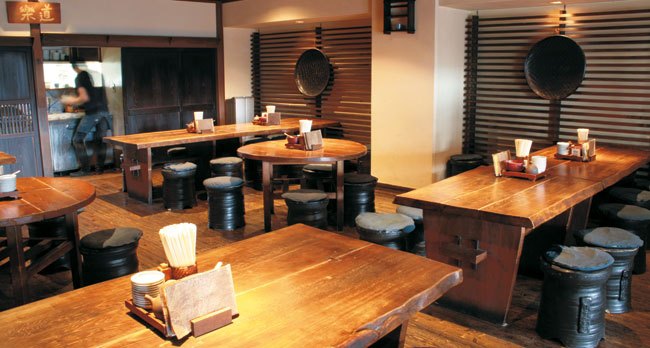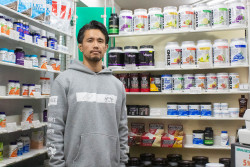
Originally published on metropolis.co.jp on April 2010

Photo by Keigo Moriyama
The rough-hewn wooden tables at soba restaurant Itasoba Santouka are nothing if not intimate. Perhaps when the owners built the place in 2001, they failed to anticipate just how popular it would become. Or maybe they just wanted strangers to get close and friendly as they drank into the night. Either way, at this perpetually busy eatery, located a good ten minutes’ walk from either Sangenjaya or Ikejiri-Ohashi stations, you can always count on company.
The main reason it’s so teeming with young, well-dressed locals is, of course, the food. But there’s more to it than that. The restaurant’s proximity to two celebrity-studded suburbs means you’re fairly likely to spot a Japanese star slurping his or her noodles incognito, or a yuppie balancing an escort on his knee. With its own-recipe soba and a wide selection of other dishes, Itasoba Santouka offers delicately prepared delights in a relaxed environment, and stays open till 4:30am.
The soba menu is extensive. We tried the kamojiru sobakiri (cut buckwheat noodles in duck broth; ¥1,080) and the kakiage sobakiri (with fritters; ¥1,250); the former came with a hot, thin broth loaded with balls of tsukune, powerful leeks and slices of slightly tough duck; the latter included a sweet soup, tempura of vegetables and fish, and grated daikon. Both were served with a wicker dish of firm noodles whose thickness diners can choose according to their preference.
Also made from soba are the complimentary crackers that adorn every table, the strong Sobajochu Towari shochu (¥480), and the soba and green tea brulée (¥400). This last combined the bitter flavors of buckwheat and tea with a sweet caramel sauce, and is probably an acquired taste.
In fact, the soba is not necessarily the best thing on the menu. We highly recommend the toriwasa (chicken sashimi; ¥580), served raw with a dollop of mind-blowing fresh wasabi. It’s also worth trying the fluffy dashi-maki tamago (¥680), aikamo yaki (grilled duck; ¥800) and itawasa (fish sausage with pickles, kombu and wasabi mixed with sake lees; ¥550).
We can’t really recommend the Sobajochu Towari shochu, which is made from the water used to boil noodles and jolly well tastes like it. But the drinks menu features other types of shochu as well as sake, cocktails, Japanese wines and beer, and the sui oroshi ringo juice (pressed apple; ¥350) is a delicious option for teetotalers.
With its warm earth tones, bamboo detailing and gentle soundtrack of easy listening and jazz, Itasoba Santouka is a comfortable place to while away the hours till morning, when sunlight begins to pour through the large glass frontage. The staff are attentive, kneeling at the table to take your order, and the washi menus and earthenware dishes lend a traditional feel. Just remember to mind your manners, because you never know who’s sitting beside you.







